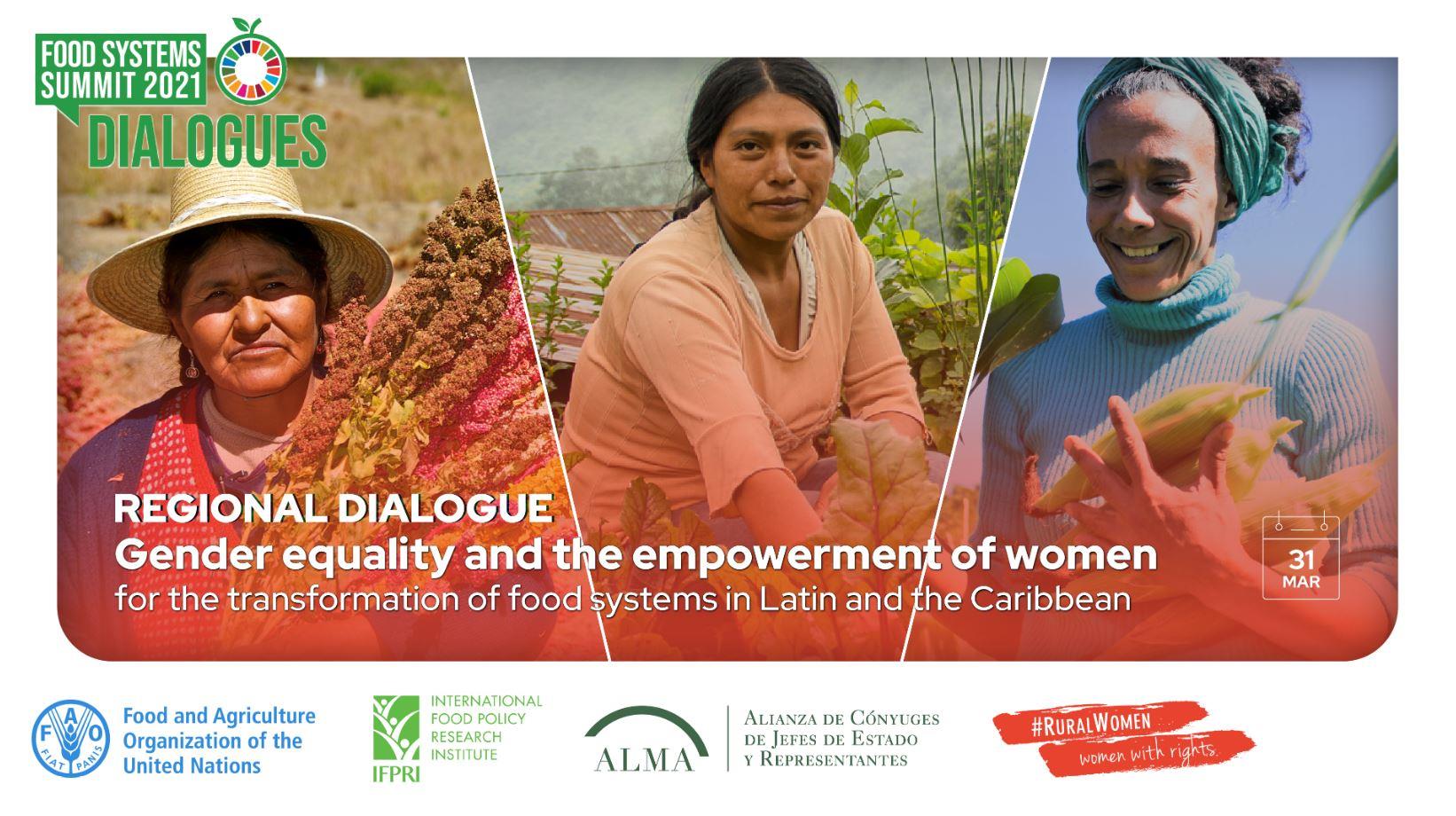Regional Dialogue on Gender Equality and the Empowerment of Women for the Transformation of Food Systems in Latin America and the Caribbean
Hybrid Event, 31/03/2021

Introduction
The transformation of food systems is a political, economic and environmental issue, but above all it is a question of gender equality. The stark inequalities experienced by women and girls are both a cause and a result of unsustainable food systems, unfair access to food, consumption and production. Addressing gender injustice and truly empowering women is not only a fundamental prerequisite for transforming food systems, but also a goal in itself.
Shaping food systems so that they are conducive to gender equality requires a combination of improved knowledge, sound policies, regulations and investments throughout the production and consumption process. We need to reframe how we view women and food systems from mainly focusing on the role of women as producers and consumers to thinking about how food and agricultural systems contribute or can contribute to the process of empowering women and how these systems can create an environment conducive to the equal exercise of women's rights. There is also need for a special attention on climate change, urging us to observe “how women's responses to climate change strengthen the resilience of food systems "and" how women can be empowered to lead the development of climate-resilient food and agriculture systems".
A fair, transformative and gender equitable food system can be defined as one that allows countries, communities, households, and men and women, to have what is necessary to produce enough food and have the access to it, for their families and populations through sustainable, environmentally sound and climate resilient practices that favour gender equity and equality.
In this context, the UN Secretary General, António Guterres, has convened Food Systems Summit as part of the Decade of Action to achieve the Sustainable Development Goals (SDGs) by 2030. As part of the preparations for the Food Systems Summit, we propose to have a regional gender dialogue to engage with governments and the regional integration mechanisms (SICA, MERCOSUR and CARICOM), civil society organizations, indigenous and Afro-descendant peoples, academia, the private sector and agencies of the United Nations System, to discuss the challenges and pathways for the development of a gender just, transformative and equitable food system that allows the full exercise of the rights and empowerment of women in Latin America and the Caribbean.
Specifically, it is expected that the regional dialogue on gender and food systems in Latin America and the Caribbean will make it possible to identify: (i) a set of solutions and commitments for gender equality in food systems (ii) a regional position on what commitments are needed to achieve gender equality in food systems for the UN Food Systems Summit.
Live broadcast, march 31st 2021, 11:00 hrs. Chile
Methodology
The dialogue will consist of two sessions:
At the opening session the FAO regional representative, Mr. Julio Berdegué, the First Lady of Argentina, Ms. Fabiola Yáñez and Dr. Jemimah Njuki, Director for Africa at IFPRI and Custodian for Gender Equality and Women’s Empowerment for the UN Food Systems Summit, Will welcome the attendees and make brief remarks highlighting the importance of achieving a gender just, transformative and equitable food system in Latin America and the Caribbean.
The discussion session will begin with a few words from the dialogue curator, Ms. Eve Crowley, who will summarize the purposes of the proposed discussion and present a global vision on the relevance of the gender approach in food systems.
The discussions will be organized into 5 working groups on each of the action tracks of the Food Systems Summit:
- Ensure access to safe and nutritious food for all
- Shift to sustainable (and healthy) consumption patterns
- Promote positive production for nature.
- Promote equitable livelihoods and value sharing
- Build resilience to vulnerabilities, adverse situations, and stresses
By sending the invitations and publicizing the event, attendees will be invited to register and select the action track in which they wish to participate. Each group is expected to identify 3 concrete actions/solutions in favor of gender equality and the empowerment of women in the food systems of the region.
Each working group will have a moderator, a resource person who will introduce the main areas of interest of the action track and a rapporteur.
At the end of the discussion, the three priority game changing solutions of each group will be presented in the screen for general comments.
Agenda
|
Regional dialogue on gender and food systems in Latin America and the Caribbean March 31st 11:00 AM – 13:30 PM Santiago de Chile
|
||
|
Hour |
Activity |
Speakers |
|
11:00- 11:30. Opening sesión
|
||
|
11:00-11:20 |
Opening remarks |
Mr. Julio Berdegué, Regional Representative of FAO for Latin America and the Caribbean.
Presence of the First Ladies of the region who are part of the Alliance of Spouses of Heads of State and representatives (ALMA). On behalf of ALMA, Ms. Fabiola Yáñez, First Lady of Argentina, will address the audience. |
|
11:20-11:30 |
Setting the scene |
Dr Jemimah Njuki, Director for Africa at IFPRI and Custodian for Gender Equality and Women’s Empowerment for the UN Food Systems Summit |
|
11:30- 13:40. Debate session
|
||
|
11:30-11:40 |
Introduction to Dialogue |
Eve Crowley, Deputy Regional Representative of FAO for Latin America and the Caribbean, and Representative of FAO in Chile |
|
11:40- 12:50 |
Group Discussion |
In charge of the group moderators |
|
12:50-13:10 |
Plenary discussion of priority game changing solutions |
In charge of the group rapporteurs |
|
13:10 – 13:40 |
Closure |
María-Noel Vaeza, Regional Director for Latin America and the Caribbean.
Eve Crowley, Deputy Regional Representative of FAO for Latin America and the Caribbean, and Representative of FAO in Chile |
Documents
More information
Videos
Contact
Contact
Catalina Ivanovic
Gender Consultant
FAO Regional Office for Latina America and the Caribbean
